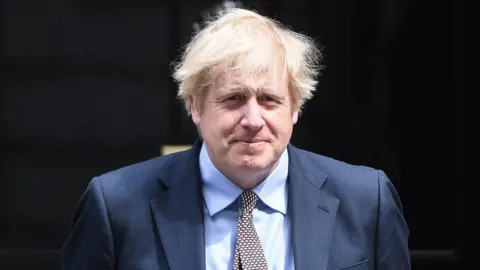Coronavirus: Boris Johnson to launch threat level alert system
 Peter Summers/Getty Images
Peter Summers/Getty ImagesAn alert system to rank the threat level of coronavirus in England is set to be launched by Prime Minister Boris Johnson in his lockdown speech later.
The system, which will use a scale of one to five, is to be a part of the PM's televised address at 19:00 BST.
Mr Johnson will also explain any changes to the lockdown measures.
It comes after the "stay at home, protect the NHS, save lives" slogan was replaced with "stay alert, control the virus, save lives".
The "stay at home" advice will remain in place in Scotland, Wales and Northern Ireland after leaders in the three devolved nations said Mr Johnson had not consulted them on the new message.
Scotland's First Minister Nicola Sturgeon said the only change being made to lockdown in Scotland was that people would be allowed to exercise more than once a day, from Monday.
A further 269 people have died in the UK after testing positive for coronavirus, taking the total number of deaths recorded to 31,855.
The number of deaths recorded tends to be lower over the weekend because of reporting delays.
The threat level system to be introduced will apply to England only but the government is working with the devolved administrations as they develop their own.
It is understood the system - with alerts ranging from green (level one) to red (level five) - will be adjusted according to data and will be similar to the one used to keep the public informed about the terror threat level.
In his address, Mr Johnson is expected to say England is currently at stage four but moving towards stage three.
The alert tool - to be administered by a new "joint biosecurity centre" - will reflect the virus threat in different parts of the country, meaning the threat level in one city could differ quite widely from another.
This could inform the local alteration of restrictions in England.

How can I follow the PM's speech?
Boris Johnson's national address will be broadcast across BBC News at 19:00 BST.
Ways to follow our coverage include:
- Watch on BBC One, BBC Scotland or BBC News Channel
- Listen on Radio 4 or Radio 5 Live. Some of our local radio stations will also air analysis and reaction
- Read our online coverage on the BBC News website or on the app (download for Apple devices here, and for Android products here)

In his broadcast, Mr Johnson is not expected to provide exact dates for when the strict curbs on daily life - which have been in place for seven weeks - might change.
The prime minister tweeted a graphic setting out new guidance for England with the message: "Everyone has a role to play in helping to control the virus by staying alert and following the rules."
Earlier Communities Secretary Robert Jenrick defended the new slogan - saying now was the right moment to "update and broaden" the message.
He said his "strong preference" was for the devolved nations "to move as one".

- A SIMPLE GUIDE: How do I protect myself?
- AVOIDING CONTACT: The rules on self-isolation and exercise
- HOPE AND LOSS: Your coronavirus stories
- LOOK-UP TOOL: Check cases in your area
- FACE MASKS: Should I be wearing one?

However, the leaders of Scotland, Wales and Northern Ireland have said they are sticking with the "stay at home" message, diverging from England.
Nicola Sturgeon said the message was "vague and imprecise".
"I don't know what 'stay alert' means," the first minister told the daily briefing in Edinburgh.
She added it would be "catastrophic" for Scotland to drop the "stay at home" message at this "critical" moment.
Shadow health secretary Jonathan Ashworth said the government must clarify what "stay alert" meant.
Part of Mr Johnson's pre-recorded statement was filmed on Saturday while the rest was being done on Sunday, a Downing Street source told BBC political correspondent Ben Wright.
The source said no significance should be attached to the timing and that it was normal for a statement to be recorded in this way.
Lockdown 'problems'
On Saturday, Transport Secretary Grant Shapps warned the government would proceed with "extreme caution" when lifting lockdown measures.
But Prof Mark Woolhouse, who is on the Scottish government's Covid-19 taskforce, said "something has got to change both in our approach to controlling the virus but also in the messaging that goes with that".
He told Radio 4's The World This Weekend that various measures could be taken with "very little impact" on the disease's ability to spread.
He said so long as people who need to self-isolate stay at home, outdoor activities "pose relatively low risk" of transmission - but only if people maintain social distancing.
"We can't stay at home forever… we've got to start having a grown-up discussion about balancing the harms [of the lockdown]," Prof Woolhouse added.
In other developments:
- A further 178 deaths of people with coronavirus have been reported by NHS England
- There were also 12 more deaths reported in Wales, 10 in Scotland and five in Northern Ireland
- The government missed its target of 100,000 tests a day for the eighth day in a row, with 92,837 tests on Saturday
- The Department of Health has confirmed 50,000 coronavirus test samples were sent to the US earlier this week after problems in UK laboratories
- Mr Jenrick said a contact-tracing app being trialled on the Isle of Wight had been downloaded by about 50,000 people. Asked about reports a second app was being developed, he said the government was "learning lessons" from apps used by other countries
- More than 70 public figures - including Baroness Doreen Lawrence and author Malorie Blackman - are calling for a full independent public inquiry into deaths from Covid-19 among people from ethnic minority backgrounds
